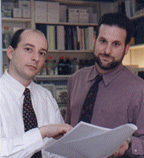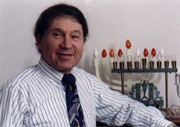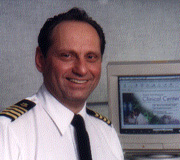past issues

|
Published monthly for CC employees by Clinical
Center Communications
March 2000
Dangerous
liaisons
Mock Joint Commission survey in April
CC welcomes new rabbi
Pharmacy deputy named
NIH Moms Club
CRC set to take
off
News briefs
Studies
|
|

Dr. Stephen Piscitelli (left) and Dr. Aaron Burstein (right)
discuss the results of their drug-interaction study involving
St. John's wort.
Dangerous liaisons
CC pharmacists uncover drug interaction with
St. John's wort
If you're like many people, you take your morning vitamin
tablet, and follow it with some sort of herbal remedy. Maybe
a little gingko biloba? Some melatonin? How about a St. John's
wort tablet?
But how much do you really know about the effects and side
effects of herbal compounds?
Dr. Stephen Piscitelli wanted to know more. In collaboration
with NIAID, he conducted a study of St. John's wort, and what
he found is sounding a cautionary note for people who take herbal
preparations.
Dr. Piscitelli, coordinator of the Clinical Pharmacokinetics
Research Laboratory of the Clinical Center's Pharmacy Department,
and his colleagues found that St. John's wort significantly reduced
the blood levels of a drug called indinavir, one of a class of
drugs called protease inhibitors taken by many patients with
HIV/AIDS.
The main ingredient in St. John's wort, hypericin, is thought
to speed up indinavir's metabolism. Consequently, not enough
indinavir remains in the blood to do the job it's designed to
do. "The low blood levels also can lead to drug resistance,"
said Dr. Piscitelli.
The study, conducted among eight healthy volunteers, first
measured the amount in the body of the drug indinavir when taken
alone. Next, study participants were given only St. John's wort
for two weeks. Finally, indinavir and St. John's wort were given
together.
"The results were dramatically conclusive," Piscitelli
noted. "All the participants showed a marked drop in blood
levels of indinavir after taking St. John's wort. The drop ranged
from 49 percent to 99 percent."
Researchers in Switzerland also published data indicating
that St. John's wort reduced the blood levels of cyclosporine,
a drug used after organ transplantation to prevent rejection.
Dr. Piscitelli's findings, published in the Feb. 12 "Lancet,"
a British medical journal, generated a flurry of media attention
last month. He granted interviews to over 15 news organizations,
and appeared on "Good Morning America."
Dr. Piscitelli's collaborative research between the CC and
NIAID has focused on how antiretroviral and cytokine therapies
are metabolized by the body, and evaluations of drug interactions.
After learning of case reports, anecdotal evidence, and research
data that all suggested a drug interaction with St. John's wort,
he thought this study seemed a logical choice to pursue.
"Depression is a common problem in the HIV-infected population,
and St. John's wort has been used and studied for depression."
A survey of the OP8 HIV clinic patients identified about 10 percent
who had used St. John's wort. "There could be thousands
of patients worldwide who are taking St. John's wort and antiretroviral
drugs," he said.
But users of complementary health practices often do not confide
these facts to their physicians, he pointed out. "Patients
may assume the doctor will have a negative reaction."
There may be a basis for that reaction, however. Herbals are
unregulated in this country. As a result, little hard science
exists to support claims of either benefit or harm.
"These compounds don't go through the rigorous testing
that pharmaceuticals do, they don't have to prove safety or efficacy,
and they are considered dietary supplements, not drugs, so they
can bypass all the standard testing which prescription and over-the-counter
drugs have to go through. So it's 'buyer beware,'" said
Dr. Piscitelli.
"There is a general misconception among the public that
these herbal products have no adverse effects and no drug interactions.
Our study clearly shows that there can be dangerous interactions
between these products and other drugs," he said.
Dr. Piscitelli urges health professionals to ask their patients
what herbals they may be taking-and be open-minded to the response.
Conversely, patients should provide this information even if
they are not specifically asked.
Dr. Piscitelli and his colleagues are currently looking at
other widely used herbal preparations, including garlic, melatonin,
gingko biloba, kava kava, and saw palmetto, to see if any similar
drug interactions occur.
"These are the most widely used of the herbal remedies
and may have the greatest impact on public health. Also, there
is existing evidence that these compounds may affect drug metabolism,"
he said.
Other collaborators on the study included Dr. Aaron Burstein
and Raul Alfaro from the Clinical Center Pharmacy Department,
and Dr. Judith Falloon and Doreen Chaitt from NIAID.
For more information on Dr. Piscitelli's upcoming studies,
or to be considered for participation, contact the Clinical Research
Volunteer Program at 1-800-892-3276.
--by Sue Kendall
But the label says....
The St. John's wort tablets Dr. Stephen Piscitelli used in
his study were commercially prepared. The research team had the
luxury of having the CC's own Pharmaceutical Development Service
test the tablets to ensure that the contents were as stated on
the label. And they were.
But that is often not the case with herbal remedies.
"Several studies have looked at various brands and found
them to range in potencies," said Dr. Aaron Burstein, a
collaborator on Dr. Piscitelli's study.
Dr. Burstein pointed to a study commissioned by the "Los
Angeles Times" in 1998, which tested the potency of 10 brands
of St. John's wort. The potencies ranged from 20 percent to 140
percent of what was stated on the label.
The recommended dosages on the label also differ, resulting
in different intake for different products, Dr. Burstein pointed
out.
"The big problem with these compounds is that they are
not regulated. They don't have manufacturing guidelines or quality
controls like a pharmaceutical drug would need to have,"
said Dr. Piscitelli.
He likens the herbal industry to Forrest Gump's proverbial
box of chocolates: "You never know what you're going to
get."
--S. K.
Back to Top
|
|
Mock Joint Commission survey
in April
|
This fall, the Joint Commission on Accreditation of Healthcare
Organizations (JCAHO) will be visiting the Clinical Center to
assess our operations. As a sort of dress rehearsal for the accreditation
survey, an independent group, Safety Management Services, will
come to the CC April 3-5 to conduct a mock survey.
In the past, the Clinical Center has received high marks from
JCAHO, and there is no reason to think this year will be any
different. However, a little advance planning can ensure that
things go smoothly.
"We welcome the mock-survey team," said Dr. David
K. Henderson, deputy director for clinical care. "It will
provide us with a scorecard that will show us areas where we
can improve. It makes good sense to do this."
The survey team, which will consist of a doctor, a nurse,
and an administrator, will meet with the Medical Executive Committee,
the Department heads, the JCAHO workgroup, and other groups,
and will perform checks of most units. Areas of scrutiny will
include:
- performance improvement and measurement
- medication administration
- assessment of patients
- conscious sedation
- use of restraints
- confidentiality, informed consent, and patients' rights
- competencies
- patient and staff education
- emergency procedures, infection control, and safety issues
According to Dr. Michele Evans, the CC's safety officer, the
upcoming fall survey will differ in a major way from past surveys.
"JCAHO isn't interested in formal presentations in meeting
rooms anymore. They will be on the floors, observing patient
care, checking for safe and sanitary conditions for workers and
patients, and other activities. The mock survey will be good
preparation for this change."
Laura Lee, special assistant to the deputy director for clinical
care, described a possible scenario: "The team could identify
a nurse or a doctor to follow into a patient's room, observe
the care being given, and then ask questions about why something
was done. They may also ask questions about what patient education
was done, and then confirm that with the patient."
This extra level of detail means the team will spend more
time on the units than in the past. Expect the visits to last
at least an hour.
"Our goal is for staff to be candid about any problems
that may exist. There is plenty of time to correct any deficiencies.
In my view, it is better to find out about problems now rather
than be surprised in October," said Lee.
After the mock survey, the group will issue its findings,
pointing out areas where the Clinical Center performed well and
areas where we can improve. Also part of the process is education
on best practices-things that other institutions are doing that
are worth emulating.
If you have any questions or concerns about the mock survey,
contact your departmental representative, or Dr. Evans at 6-5281,
or Laura Lee at 6-8025.
-by Sue Kendall
Back to Top
|
CC welcomes new rabbi

Rabbi Reeve Brenner
|
The Clinical Center's Spiritual Ministry Department (SMD)
welcomed a new rabbi, Reeve Robert Brenner, to its staff of five
full-time chaplains. The SMD's chaplains offer spiritual support
and guidance to CC patients of all faiths.
Rabbi Brenner filled in as interim Jewish chaplain for SMD
late last year before coming on board part time in January. Since
then, he has met with a number of patients and is learning his
way around.
"Having gotten a taste of the Clinical Center when I
was invited to help out over the holidays, I was very impressed
by the impact a rabbi can have for patients. It's a fruitful,
important, and challenging ministry."
Rabbi Brenner explains the importance of having a rabbi here
at the hospital.
"It can be a great comfort for people who may be far
from home, or temporarily disconnected from family and support
systems. Jewish people are grateful that there is a rabbi around
to relate to. Even if they themselves may not be overly religious,
they know that if a rabbi's here, there is a real connection
for them. They can talk differently to a rabbi than they talk
to other people."
In addition to his new responsibilities at the CC, Rabbi Brenner
continues to minister at the Bethesda Jewish Congregation, where
he has served for 14 years.
"I've served a variety of congregations on the East Coast,
served as an Army chaplain, and spent many years in Israel raising
my family and writing some books, one of which is called 'The
Faith and Doubt of Holocaust Survivors,'" he said.
An avid basketball player, Rabbi Brenner invented Bankshot,
a recreational program featuring wheelchair-accessible sports
based on universal design.
"The sports have no aggression no running and jumping,"
he explained. "They are total-mix sports, meaning that players
of all ages and physical abilities can play together."
His interest in universal design was spurred by a cousin who
was disabled in an accident, but subsequently became a wheelchair
athlete. Details on the sporting programs can be found on his
web site at http://www.bankshot.com,
including an article that appeared in "Sports Illustrated"
magazine.
Rabbi Brenner's other interests include raising endangered
turtles and releasing them back into their natural habitats.
He has published a book of humor entitled, "Yiddle's Riddles."
A native New Yorker, he loves the Yankees and the Knicks.
He's at the CC Mondays, Wednesdays, and Fridays. He invites
people to drop by and introduce themselves, chat about sports,
or do some soul-searching.
"It's good to have a rabbi around if for no other reason
than to be able to open up to him in a way you would to an uncle
or to someone close to you. It is the fulfillment of a ministry
when you realize you can provide some substance to the people
who are here. I'm enjoying it very much."
-by Sue Kendall
Back to Top
|
Pharmacy deputy named

Capt. Robert De Christoforo
|
Capt. Robert DeChristoforo has been named deputy chief of
the Clinical Center Pharmacy Department. In his 21 years with
the Pharmacy Department, Capt. DeChristoforo has held such positions
as clinical pharmacist and drug information officer. His deputy-chief
duties include continued leadership of the Inpatient Pharmaceutical
Care Section.
He received his bachelor of science in pharmacy from the Massachusetts
College of Pharmacy and Allied Health Sciences in Boston, and
earned his master of science degree at Northeastern University
in Boston. Capt. DeChristoforo completed a hospital pharmacy
residency at the USPHS Hospital in San Francisco and received
the USPHS Career Achievement Award in Pharmacy as well as the
Hospital Pharmacist of the Year Award from the District of Columbia
Society of Hospital Pharmacists (DCSHP).
He is a contributing editor for the AIDS Facts column of the
"American Journal of Health-System Pharmacy" and has
been president of the DCSHP and the DC Metro Area branch of the
Commissioned Officers Association.
In 1998 he received the PHS Outstanding Service Medal for
his efforts in HIV education and safe handling of hazardous drugs.
Back to Top
|
Quality of Worklife

|
NIH Moms Club
Did you know that NIH has a Moms Club composed of NIH staff
who are mothers? The group was formed almost five years ago to
share information, as well as provide support mechanisms.
All interested staff are invited to get together on the first
Tuesday of every month at noon in the Bethesda Room, which is
part of the B1-level cafeteria. There is open membership, so
feel free to come whenever you can.
Members of the group hope to have regularly scheduled guest
speakers to discuss topics of interest, including what to do
when your baby has a fever, how to creatively arrange day care,
and lactation issues at NIH.
One of the major areas of interest for the group was seeing
a lactation program at the NIH. There are now onsite lactation
rooms in Bldgs. 31 (Room B2B39), 10 (Room 6C426, next to OMS),
45 (Room 6AN16), 49 (Room 1A63), and the Neuroscience Research
Center at 6001 Executive Blvd. (Room 111). For more information
on the lactation program, visit http://odp.od.nih.gov/whpp/events/lactation.html,
or call 5-7850. For more information on the Moms group please
visit their web site at http://www.recgov.org/moms/.
This information was brought to you by the CC Quality of
Worklife Council.
Back to Top
|
 |
CRC set to take off
Rapid progress is occurring on the new Clinical Research Center
(CRC), according to Don Sebastian, of the Division of Engineering
Services. "The first phase of construction is complete,
which includes the building's foundation-the concrete slab, support
columns, and walls. Underground utility lines have also been
placed. Now people will start to see things happen rapidly,"
he said. A fourth tower crane has been erected. With all cranes
functional, materials can be moved to 90 percent of the construction
site. Baker Concrete has been contracted to complete the remaining
concrete work. Baker has erected a concrete plant on site (left),
which can deliver up to 200 cubic yards of concrete per hour,
made to CRC specifications. The plant has a quality-control system
to monitor the concrete's strength.
Interested in keeping up with CRC construction? Monthly status
reports will be posted to this web site: http://www.cc.nih.gov/ccc/crcnews/updates.html
Back to Top
|
News briefs
Classes offered
Call the Education and Training Section of OHRM at 6-1618
to register for the following classes:
"Really Effective Scientific and Technical Presentations,"
March 22 and 23, from 9 a.m. to 4 p.m. During this 2-day class,
presenter Richard C. Oliver, M.S., will teach techniques for
delivering papers at professional meetings or presenting data
to small or large groups of scientific peers or nonprofessionals.
You will also learn how to design a PowerPoint presentation and
use it skillfully and smoothly. You will have the opportunity
to make a brief videotaped presentation for immediate feedback
from peers and the instructor.
"Management Essentials," April 5, from 9 a.m. to
4 p.m. Presenter Rosalind Jeffries, M.A., will help you develop
a sample management plan, decide how to put your plan in action,
evaluate the needs of your employees, learn how to implement
change, and manage conflict constructively. Skills necessary
to become effective managers and leaders will be explored.
"Macintosh Computer Training," April 17, Excel;
April 18 or 21, Microsoft Word; April 19, FileMaker Pro; April
20, PowerPoint.
Have your Departmental Contact call to register you for Macintosh
training. Space is limited.
All classes are held at 6100 Executive Blvd., Room 3E01. The
building is shuttle-bus accessible. Visitor parking is $6 per
day.
Blood shortage
The Department of Transfusion Medicine is in critical need
of type O blood. Several recent surgical procedures have significantly
depleted our inventory of this type of blood. If your blood type
is O, please donate by visiting the Blood Bank, Bldg. 10, Room
1C713B, or call 6-1048. We need your help to continue to supply
blood to our patients.
Management interns
The NIH Management Intern Program is accepting applications
until March 14. This 12-month career development program will
accept up to 5 participants for positions at the GS-5, GS-7,
and GS-9 levels. Employees above the GS-9 level must accept a
downgrade but may retain their previous salary levels. Interns
receive training in a variety of administrative fields. Graduates
are eligible for non-competitive promotion to the GS-12 level.
Apply on-line at http://internships.info.nih.gov.
For details, call the NIH Intern Coordinator at 6-2403 (press
7 to leave a message).
Parking renewals
NIH general parking permits for campus employees whose last
names begin with E, F, or G will expire on the last day of March.
To renew yours, visit the NIH Parking Office in Bldg. 31, Room
B3B04, weekdays between 7:30 a.m. and 4:30 p.m. Be sure to bring
your valid NIH identification card, driver's license, and valid
vehicle registration certificate for each vehicle to be registered.
Training conference
The 2000 National Training Conference on Employment of Federal
Employees Who are Deaf or Hard of Hearing will be held on March
7, 8, and 9, at the Natcher Conference Center. All are welcome
to attend. Registration is $50 prior to the conference; if registering
on-site, the cost will be $75. For details, check the web site,
http://www.dhhig.org/ntc/,
or contact Lori Ingram at TTY: 2-1562, or Federal Relay Service,
1-800-735-2258 (Voice/TTY), or e-mail: Lori_Ingram@nih.gov.
Garage finished
The concrete restoration in the CC garage is complete. Cleanup
should be finished by March 15, and most of the parking spaces
should be back in use, according to project officer Buck Lewis.
A renovation effort will soon begin, including fresh paint, parking
stripes, brighter lighting, and new signs. But Lewis says that
work will be done after hours to minimize disruption. Construction
of the new Clinical Research Center will also continue to cause
temporary disruptions and loss of parking spaces from time to
time.
Gallery change
The exhibit in Gallery I changes the first of this month.
The featured artist is Sean Callahan, a watercolorist and CC
patient. The exhibit runs through May 3. Gallery I is located
on the first floor of the Clinical Center, near the coffee shop
and flower shop.
Back to Top
|
Studies
Twin study
Healthy, adult, identical-twin pairs are needed for a study
of the differences in the genotype and phenotype of the T-cell
receptor. Study procedures include a thorough medical history,
HLA testing, complete blood count, and leukapheresis. Participants
should be available for further questioning about their medical
histories. Participants will be paid for their blood donations.
If you have responded to this inquiry in the past, please resubmit
your name and phone number for another phase of the study. Call
the HLA Laboratory at 6-8852 for details.
Sickle cell study
NIDDK researchers are conducting a study to better understand
sickle cell anemia. Healthy adult volunteers with sickle cell
trait are needed. The study involves blood draws, injections
of granuloctye-colony stimulating factor, and a leukapheresis
procedure. Volunteers will be financially compensated if they
are selected for the study. For details, call 1-800-411-1222
or 2-3087.
Healthy mothers
NIMH researchers seek right-handed mothers aged 20 to 40 with
non-adopted, first-born children aged 5 to 12 to participate
in an fMRI study on the visual processing of faces. Volunteers
should have no history of medical or psychiatric disorders, and
should not be taking prescription medication (including birth
control pills). The first-born children of volunteers should
have no history of psychiatric illness or chronic medical problems.
Volunteers must have normal vision or wear contacts. Participation
requires a 2-hour screening interview, a follow-up visit, and
a 3-hour visit for the fMRI scan. Participants will be reimbursed.
For more information, call Lisa Kalik or Neil Santiago at 6-8381.
Endometriosis study
NICHD researchers invite women with pelvic pain associated with
endometriosis to take part in a new treatment study. Call the
Patient Recruitment and Public Liaison Office for more information
at
1-800-411-1222.
Visual study
NIMH researchers seek men aged 56 to 73 and women aged 51
to 59, to participate in an fMRI study on the visual processing
of faces. Partici-pants must be right-handed and currently married.
Volunteers should have no history of medical or psychiatric disorders,
and should not be taking prescription medication (except hormone
replacement therapy for women). Volunteers must have normal vision
or wear contact lenses. Participation requires a 2-hour screening
interview, a follow-up visit, and a 3-hour visit for the fMRI
scan. Participants will be reimbursed. For more information,
call Lisa Kalik or Neil Santiago at 6-8381.
Overweight teen?
Parents, consider enrolling your teen in an NICHD study of
a promising weight-loss medication. The Food and Drug Administration
has approved the study drug, Orlistat, for use with adults. This
study takes place at the Clinical Center. NICHD provides all
study tests, medication, and weight-control education at no charge.
Overweight teens, aged 12 to 17, who can attend weekly weight-control
meetings may be eligible. Call the Patient Recruitment and Public
Liaison Office for more information at 1-800-411-1222.
Uveitis study
NEI seeks adults and children with uveitis for research studies
to help find ways to improve diagnosis and treatment. Participants
receive study-related eye exams, testing, and care at no charge.
For more information, call the Patient Recruitment and Public
Liaison Office at 1-800-411-1222.
Back to Top
|
Clinical Center News, 6100 Executive
Blvd., Suite 3C01, MSC 7511, National Institutes of Health, Bethesda,
MD 20892-7511. Tel: 301-496-2563. Fax: 301-402-2984. Published
monthly for CC employees by the Office of Clinical Center Communications,
Colleen Henrichsen, chief. News, article ideas, calendar events,
letters, and photographs are welcome. Deadline for submissions
is the second Monday of each month.
top | cc
home page | nih home
page | |
|

